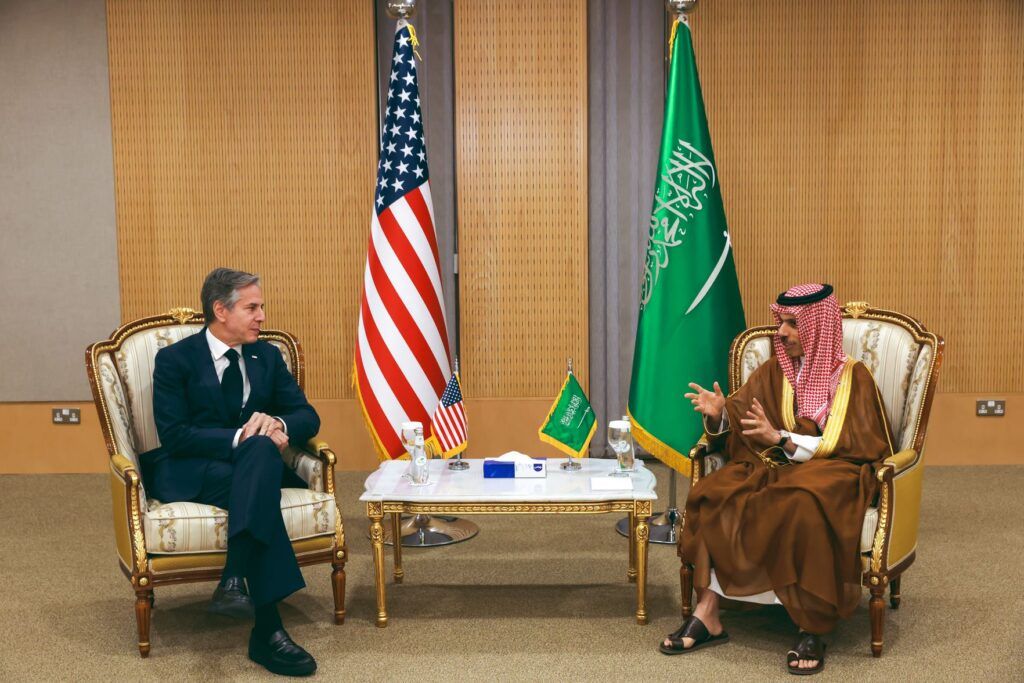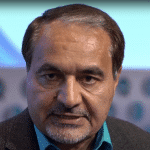An alternative to the proliferation of uranium enrichment in the Middle East
By Seyed Hossein Mousavian, Frank von Hippel | October 10, 2023
 US State Secretary Antony J. Blinken meets with Saudi Foreign Minister Faisal bin Farhan in Riyadh, Saudi Arabia on June 7, 2023. Despite Blinken’s visit, differences remain over Saudi Arabia's ambitions to develop its own civilian nuclear power industry and Washington seeing it as a potential proliferation risk. (Photo by Hisham Mousa / US State Department, via Flickr)
US State Secretary Antony J. Blinken meets with Saudi Foreign Minister Faisal bin Farhan in Riyadh, Saudi Arabia on June 7, 2023. Despite Blinken’s visit, differences remain over Saudi Arabia's ambitions to develop its own civilian nuclear power industry and Washington seeing it as a potential proliferation risk. (Photo by Hisham Mousa / US State Department, via Flickr)
During recent negotiations, Saudi Arabia reportedly has asked for three big concessions in exchange for normalizing relations with Israel: recognition of Saudi Arabia’s right to uranium enrichment; a US security guarantee for Saudi Arabia; and Israel’s recognition of an “independent Palestinian state.”
With regard to enrichment, Saudi Arabia has proposed that the United States partner with it in building a “nuclear Aramco” that would enrich and presumably export nuclear fuel. Israel, which has its own unacknowledged nuclear weapon program, correctly sees uranium enrichment as a route to nuclear weapons and has long opposed it in Iran and other Middle Eastern countries. At the United Nations on September 23, Prime Minister Netanyahu stated, “As long as I’m prime minister of Israel, I will do everything in my power to prevent Iran from getting nuclear weapons.”
Paradoxically, however, he may be working with the Biden administration on a deal that would allow uranium enrichment in Saudi Arabia, under US supervision.
A Saudi enrichment program—even in partnership with the United States—would likely prompt other nations, including the United Arab Emirates (UAE), Turkey, and Egypt, to launch their own enrichment programs. But a multinational consortium could supply the nuclear power plants of Middle Eastern countries while assuring the world that the enriched uranium it produced is used only for peaceful purposes.
The Hamas attack on Israel last week will certainly complicate and likely delay any agreement among Israel, the Saudis, and the United States. Eventually, however, the nuclear fuel needs of the Middle East will have to be addressed, and a multinational uranium enrichment enterprise seems a practical possibility for containing nuclear weapons proliferation in the region.
The enrichment landscape. Under Article 4 of the Treaty on the Non-Proliferation of Nuclear Weapons (NPT), every member state has the right to access nuclear technology for peaceful purposes. Since the 1970s, however—when India used reprocessing technology provided by the United States to launch its nuclear weapons program and Pakistan responded by launching its own nuclear weapons program using uranium enrichment technology obtained illicitly from the Netherlands—the spread of the capabilities to separate plutonium and enrich uranium have been central to the international debate over nuclear weapons nonproliferation policy.
The motivations for Saudi Arabia (or any other Middle Eastern country) to create a uranium-enrichment program would not be economic. No small enrichment program, including those of Brazil, Iran, and Japan, makes economic sense. Smaller programs simply cannot compete with the major suppliers of enrichment services: Russia, France, China, and URENCO. URENCO, with the second largest enrichment capacity after Russia, is owned jointly by Germany, the Netherlands, and the United Kingdom.
Even the United States abandoned its efforts to subsidize a private enrichment program in the face of this international competition. The only enrichment capacity in the United States today is owned by URENCO.
If it is impossible to prevent the spread of enrichment capabilities to the Middle East, however, the best alternative to a dangerous proliferation of national programs would be a multinational consortium such as a URENCO for the Middle East. A multinational would be more economically viable. It also would provide greater assurance to the world that the enrichment is strictly for peaceful purposes and would be a great confidence-building measure among the member states in the region.
Indeed, one motivation for the founding of URENCO in 1970 was the Soviet Union’s concern about Germany having a national enrichment program. A Middle East enrichment consortium could include protections against technology leakage and foreign partners that have enrichment expertise, including the United States. All the Middle Eastern partners in such a consortium would have to forego national enrichment programs and use the enriched uranium produced by the consortium to fuel their nuclear power plants.
Both moderate and hardline Iranian presidents floated a related idea in 2005. That spring, one of us (Mousavian) accompanied Iran’s future president, Hassan Rouhani, then secretary of Iran’s Supreme National Security Council, to separate meetings with the heads of the other Persian Gulf States with whom he offered to share Iran’s enrichment technology. That September Iran’s new hardline President Ahmadinejad, in a speech at the UN, stated, “The Islamic Republic of Iran is prepared to engage in serious partnership with private and public sectors of other countries in the implementation of uranium enrichment program in Iran … as a further confidence-building measure.”
A Saudi-Iranian enrichment partnership? The location of a multinational Middle East enrichment program would of course be a contentious issue. But if this issue could be dealt with, Saudi Arabia and Iran could be founding partners of a Middle East enrichment consortium. In the first step, building on the recent efforts at détente between Iran and Saudi Arabia, a regional security and cooperation system could be established in the Persian Gulf. This regional cooperation system could contain a multilateral enrichment mechanism coupled with a pledge by consortium members not to acquire nuclear weapons or national enrichment or plutonium separation programs in the context of wider political, security, economic and cultural cooperation.
Other Middle Eastern countries could join in a subsequent phase. That could provide a long-term solution to concerns about Iran’s national program.
Israel, the only country currently possessing nuclear weapons in the Middle East too could join and monitor the facility if it abandoned its nuclear weapons program and dismantled its nuclear weapons. That would realize the dream of a Middle East nuclear-weapons-free zone that has been on the international agenda for 50 years.
Given the deep wells of distrust in the Middle East—deepened today by Hamas’ attack on Israel—our proposal may be dismissed as politically infeasible. If political leaders cannot imagine a more peaceful, secure, and stable future for the region, however, no progress will be possible. A Saudi-Iranian uranium-enrichment consortium could be a step on a path toward reduced nuclear risk for the entire region.
Together, we make the world safer.
The Bulletin elevates expert voices above the noise. But as an independent nonprofit organization, our operations depend on the support of readers like you. Help us continue to deliver quality journalism that holds leaders accountable. Your support of our work at any level is important. In return, we promise our coverage will be understandable, influential, vigilant, solution-oriented, and fair-minded. Together we can make a difference.
Keywords: Iran, Saudi Arabia, URENCO, uranium enrichment
Topics: Nuclear Energy, Nuclear Risk, Nuclear Weapons
















Saudi Arabia, according to media reports, has vowed to develop (or obtain) nuclear weapons if Iran starts producing them. Israel is already determined to act if Tehran takes this course (or the final step of it). That would require missile and air strikes against Iran, which would drag in other states in the Middle East as Tehran retaliates, particularly around the Persian Gulf. That in itself would play into the war in Ukraine and the growing Sino-American confrontation in Asia. As history shows regional conflicts (cataclysmic as they might be) can lead to wider conflagration. That is why powers need… Read more »
Thorium needs no enrichment and there is no legitimate pathway to making a practical nuclear weapon from it – you can run it in an inhernently safe Gen 4 reactor and can choose to build a sub-critical reactor if you really wanted. There is no need for enrichment anywhere in the middle east – but Thorium could solve their energy needs and call the lie on their nuclear weapons program if that was what the Saudis really want.
Withholding uranium fuel as a sanction has always been a concern for nations dependent on nuclear power, so they want energy independence. Wouldn’t the US sanction Iran’s power plant this way? Did not a UN group designate Khazakstan to be a neutral supplier of last resort? What’s happened to that plan?
It is my understanding that a Generation IV (fast) nuclear reactor requires no enriched uranium. Thus, any enrichment program can be forbidden and the area can still have nuclear reactor power. In addition, a Gen IV reactor is about 100 times more efficient in its use of fuel and has less high-level waste, because what would have been waste is used for fuel in a Gen IV reactor.
“A Middle East enrichment consortium could include protections against technology leakage.”
===
Except we know that the only previous such consortium, URENCO, suffered technology leakage in the 1970s, when a Pakistani employee stole centrifuge designs that facilitated programs to produce nuclear weapons-grade, highly enriched uranium in Pakistan, Iran, N. Korea, and Libya – all but one of which succeeded. It is odd for this article to ignore that proliferation history, which is summarized here: https://carnegieendowment.org/2005/09/07/a.-q.-khan-nuclear-chronology-pub-17420
The Saudi proposal of a “nuclear Aramco” with the US is not only sane and responsible but is definitely highly plausible. So also would a similar bilateral enrichment arrangement between Iran and Russia be plausible too. Well, why not when Israel had long established a loose precedent in this regard. Given the Saudi readiness to even recognise this Israeli illegitimate entity in exchange for a bilateral arrangement with the US, it is also possible to work towards a multi-lateral regional nuclear enrichment arrangement subsequently ala URENCO integrating Kazakhstan as well as a uranium supplier of last resort to the region.… Read more »